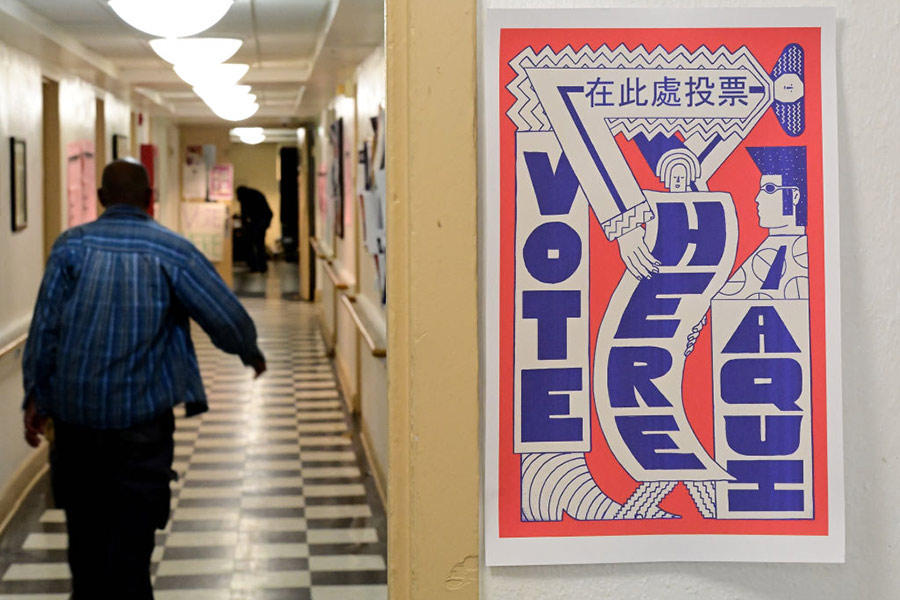Why Are 42 Percent of Black Voters Still Undecided on Philly’s Next Mayor?
In a crowded race filled with diverse options, here's why I believe Black voters remain cautious — and why we shouldn't be surprised.

A Philadelphia polling place during the November 2022 midterms / Photograph by Mark Makela/Getty Images
With just a month to go until the city’s Democratic primary, there’s still a sense of uncertainty surrounding who will become Philly’s next mayor. In previous cycles, there would normally be a front-runner or two at this point (Jim Kenney and Anthony Williams in the last two mayoral primaries, for sure) based on independent polling. But this year has remained chaotic and, despite a few recent drop-outs, the crowded race is still anyone’s to win. And now new data about Philly’s Black voters confirms that.
A main reason for this seems to be that a very large number of Black voters, who make up a plurality of the city’s population, remain undecided on the question of our next mayor. According to a new poll commissioned by the Black Leadership PAC in Philadelphia, a newly formed coalition of business, labor, community and civic leaders focused on advancing Black political power, about 42 percent of Black voters in the city are undecided on the mayor’s race. Conducted by HIT Strategies, the early March poll of 400 Black Philadelphia voters also found that 59 percent were dissatisfied with the direction of the city, and that gun violence/crime/public safety were their top issues, with 89 percent of them believing that their vote is “very or somewhat powerful when it comes to making changes on issues that matter to them.”
“In some ways this poll is unprecedented,” said Terrance Woodbury of HIT Strategies, in a statement. “To be this close to the primary and have 42 percent of Black Philadelphia voters undecided suggests a significant gap between what candidates are offering and what these voters feel is needed. Philadelphia seems to be at a crossroads. The decisions of this voting community and the results of this election will determine the direction of this city at a pivotal time.”
I initially thought that such a high level of indecision could be due to a lack of interest in the race. Based on recent races, Black voters would have rallied behind a particular candidate at this point. I remember back in 2015 how the Northwest Coalition drove Black voters to then-mayoral candidate Jim Kenney, as they would again for his re-election in 2019.
But now I sense that previous Black political coalitions, such as the one in the Northwest who once had such sway in the past, are less potent. Black voters have multiple diverse candidates to choose from, which may partially explain why we are not as quick to coalesce behind a candidate. Being a Black voter in 2023 feels and looks a lot different than in previous races — as it should.
For starters, this is the first mayoral primary since the pandemic and racial uprisings of 2020. Those historical events have left an indelible mark on how we understand the power of our vote and the policies that shape us. It also doesn’t help that many of the current mayoral candidates haven’t made sharper distinctions between themselves, which makes it harder to compare and contrast.
Recent local elections have shown us that Black voters are driven more by the issues that affect their lives and livelihoods than the identities of the individuals seeking to address them. Black Philly voters helped elect a white man from South Philly for mayor twice against a longtime Black state senator from West Philly. Black Philly voters were pivotal in electing a white man to become the successor of the city’s first Black district attorney — twice.
In other words, we shouldn’t be surprised that more than 40 percent of Black voters are keeping their options open this close to the primary.
This is what a democracy should look like: A plurality of voters not being easily predicted to go one way or the other based on identity politics. In fact, such a reality check should propel these candidates to work even harder to make the case to all constituencies. For too many years, “undecided voters” always tended to mean white. Right now, Black Philly voters are redefining what an undecided voter looks like and this will be critical in shaping how these candidates sharpen their appeal and strategy in the final weeks.
Like in previous Philly primaries, the Black vote will be the deciding factor of who runs our town. But this time, it appears that the candidates are going to have to work even harder to earn it — rightfully so.


